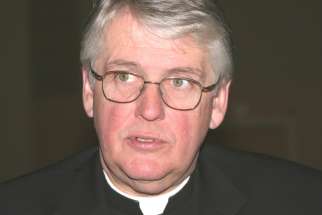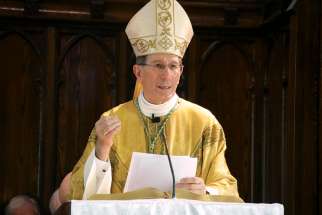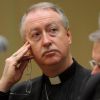Canadian bishops to update their policies on abuse prevention
CORNWALL, Ontario – Canada's bishops are finalizing new policies to better protect minors against sex abuse.
At plenary, Nuncio calls bishops to do pastoral work ‘on their knees’
CORNWALL, Ont. – The Canadian bishops were exhorted to do pastoral ministry “on their knees” before God and before Christ in the people they serve.
Canadian Conference of Catholic Bishops plenary to examine updated guidelines on clerical sexual abuse
Ste. ADÈLE, Que. - At their annual plenary Sept. 24-28 the Canadian Conference of Catholic Bishops (CCCB) are examining the prevention of clerical sexual abuse as part of its packed five-day agenda.
The 90-plus bishops gathered from across Canada will receive the updated guidelines prepared for submission to the Congregation for the Doctrine of the Faith, conference president Archbishop Richard Smith said in his annual president’s address at the Mont-Gabriel Hotel here Sept. 23.
“Of course our ongoing response must extend far beyond the articulation of protocols and procedures to an embrace in love and compassion of any person, family or community affected by this scourge,” Smith said.
The reflections will also deal with the impact of the clerical sexual abuse crisis on the ministry of priests and how bishops can provide better support. It will also look at the conditions that increase the risk of sexual abuse with an eye to prevention, according to the CCCB program for the week, most of which is closed to visitors and news media.
“How do we foster healing? How do we ensure safe environments? What are the situations that could facilitate boundary violations?” Smith asked, stressing that those in ministry must provide an “unblemished” example.
For the first time, a federal cabinet minister will address the plenary assembly. The off-the-record discussion with Immigration Minister Jason Kenney arose out of suggestion by previous CCCB president Bishop Pierre Morissette that there be more conversation with government representatives, said Smith, now in his second year of a two-year term as president.
“Over the last few years particularly, a number of you have posed questions about Canadian immigration and refugee policies,” Smith said, noting the bishops “as pastors of the Church are to give particular care for refugees and others displaced because of violence and poverty.”
The relationship between Kenney and the bishops has been contentious in the past, with Kenney firing back at a letter from the CCCB’s justice and peace commission critical of anti-human smuggling legislation the commission feared risked harming refugees more than smugglers. Kenney accused the bishops of relying on bureaucrats who “cut-and-pasted” talking points from immigration advocacy groups.
The session with Kenney will also give bishops an opportunity to talk about the difficulties they have with bringing priests in from foreign countries to serve in their dioceses.
The bishops will also reflect on a pastoral response to the suffering caused by the economic downturn.
“We often hear it said that Canada has not been impacted as seriously as other countries,” Smith said. “While that may be true, nevertheless it is of cold comfort to the unemployed or those struggling to find affordable housing.”
Smith used a theme of unity to organize the many initiatives and programs of the CCCB over the past year, noting the mission of bishops is to serve the Church’s unity.
The CCCB adopted a national plan for life and family that is now underway, that is another sign of unity “in our witness to the beauty and sanctity of life,” he said, noting respect for life continues to erode in Western society.
“Every society needs the assurance its caregivers can be entrusted with the lives of its vulnerable members — those in the womb, children, the elderly, the handicapped and the infirm,” he said. “The grave crimes of abortion, euthanasia and assisted-suicide seriously undermine that trust. These are real threats not only to the individual but also to the common good.”
The bishops are summoned to find ways to “reinforce the central ideals of Christian family life, and to celebrate the love and nurturing that many families today achieve despite difficulties,” he said. Smith said the CCCB would be calling on diocesan life and family offices as well as the Catholic Organization for Life and Family (COLF) for help in this endeavour.
The meetings on the Canadian Catholic Organization for Development and Peace have an hour dedicated to reports by the bishops on the agency's board and from the Standing Committee for Development and Peace.




